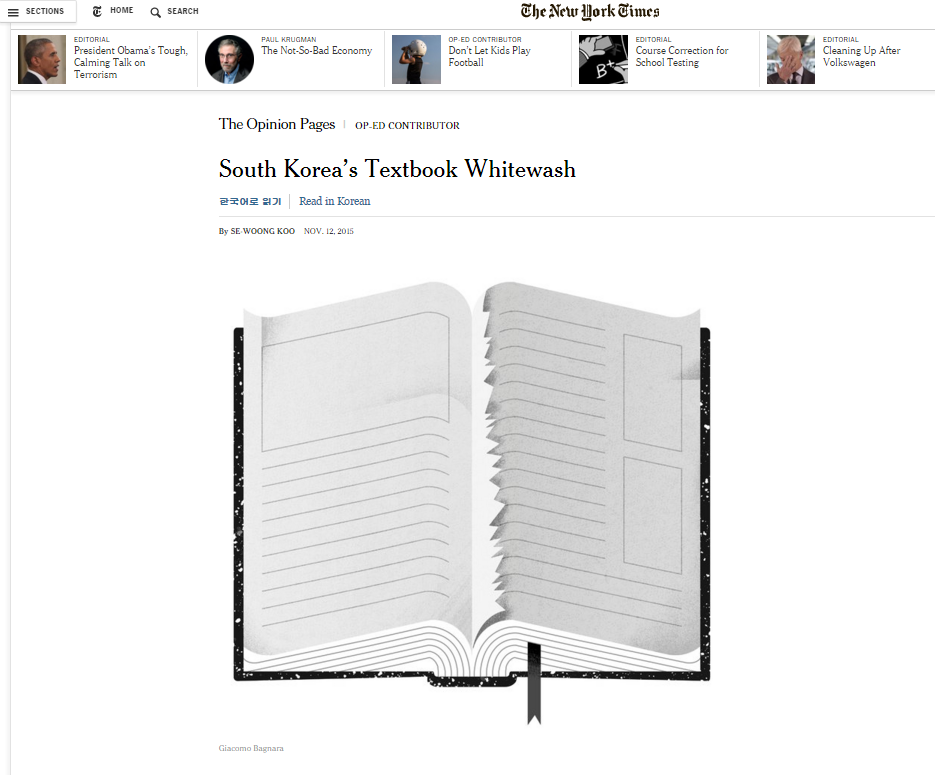- California Assembly OKs highest minimum wage in nation
- S. Korea unveils first graphic cigarette warnings
- US joins with South Korea, Japan in bid to deter North Korea
- LPGA golfer Chun In-gee finally back in action
- S. Korea won’t be top seed in final World Cup qualification round
- US men’s soccer misses 2nd straight Olympics
- US back on track in qualifying with 4-0 win over Guatemala
- High-intensity workout injuries spawn cottage industry
- CDC expands range of Zika mosquitoes into parts of Northeast
- Who knew? ‘The Walking Dead’ is helping families connect
S. Korean gov’t draws criticism for pressuring foreign press

(Screenshot of a New York Times opinion piece critiquing the South Korean government’s efforts to rewrite history textbooks)
By Yi Whan-woo
South Korea’s government is drawing international concern for allegedly putting pressure on foreign journalists who have published articles that are critical of President Park Geun-hye and her style of governance.
The Ministry of Foreign Affairs and its consulate general in New York recently sought to discuss the content of articles published respectively by The Nation and The New York Times.
Observers say such a reaction may make international readers feel that the government is not fully committed to freedom of speech and is overly sensitive to critical opinions about the President.
“The whole world knows that Korea is a democratic country and people will not simply judge the Park government as a dictatorial regime as in the past after reading some articles,” said Park Won-gon, an international relations professor at Handong University said.
The Nation published an article written by Tim Shorrock, “In South Korea, a dictator’s daughter cracks downs on labor,” Dec. 1.
The reporter compared Park’s opposition to anti-government rallies with the authoritarian leadership of her late father and iron-fisted ruler Park Chung-hee in the 1960s and ‘70s.
According to Shorrock, his newsroom editor received “a spate of phone calls” from the Korean consulate general there to “discuss” his articles.
“The man I talked to on the phone did not go into any details, nor did he point out — or even claim — that there were factual errors. Just vague along the lines of the ‘remarkable progress Korea has made over the past decades,’” the editor was quoted as saying by Shorrock on his Facebook on Dec. 4.
On Nov. 26, the foreign ministry said it lodged a protest against The New York Times following publication of an article, titled “South Korea’s Textbook Whitewash.”
Made available online on Nov. 12, Koo Se-woong, a contributing opinion writer, assessed Park’s plan to publish state-authored history textbooks for middle and high school students as a move to “whitewash the past to bolster the conservative cause at the expense of the education system and South Korea’s international reputation as a democracy.”
Last year, the Seoul Central District Prosecutors’ Office brought criminal charges against Japan’s Sankei Shimbun bureau chief.
“Such measures will surely leave an impression that the Park government is trying to censor news,” a researcher at a state-run think tank said on condition of anonymity.
The Seoul Central District Prosecutors’ Office still claims that Tatsuya Kato, a former Japanese correspondent in Korea, should face an 18-month jail term after bringing defamation charges against him in October 2014.
Kato awaits a court ruling on Dec. 17 after facing charges regarding his column about rumors concerning Park’s whereabouts on the day of the Sewol ferry disaster on April 16, 2014. The country’s worst maritime disaster, which claimed the lives of 304 people, mostly high school students.
The prosecution had imposed a travel ban on Kato, lifting it in April this year after his term as Seoul bureau chief ended in October 2014. The lift on the travel ban only came after the Seoul Foreign Correspondents’ Club expressed concerns over the Park government’s pressure on journalism.
The measure also came amid speculation that the Kato case could hamper Korea-Japan relations on the occasion of the 65th anniversary of the restoration of bilateral ties.
“The government has been reacting in an overly sensitive way about the Kato case although it’s fair to say that Park may have found Kato’s column to be offensive,” Park Won-gon said.
“But even if she thought so, it was her, not the government, who should have filed a suit against Kato personally.”
Park Won-gon claimed it was “reckless” for the Korean Consulate General in New York to contact The Nation, a New York-based weekly magazine, regarding the content of an article.
















Pingback: New York State Government News Articles | cheap - flights to newyork
Pingback: General Consulate Of Japan New York | burger - food in newyork
Pingback: Revolution Facebook Style New York Times | daily - news of newyork
Pingback: New York Times Seoul | central - parks in newyork
Pingback: New York Times Foreign Bureaus | winter - newyork weather
Pingback: Korea New York Times | living in newyork
Pingback: Korea New York Times | jobs in newyork
Pingback: General Consulate Japan New York | news of newyork
Pingback: Consulate South Korea New York | map - newyorkmuseums.xyz